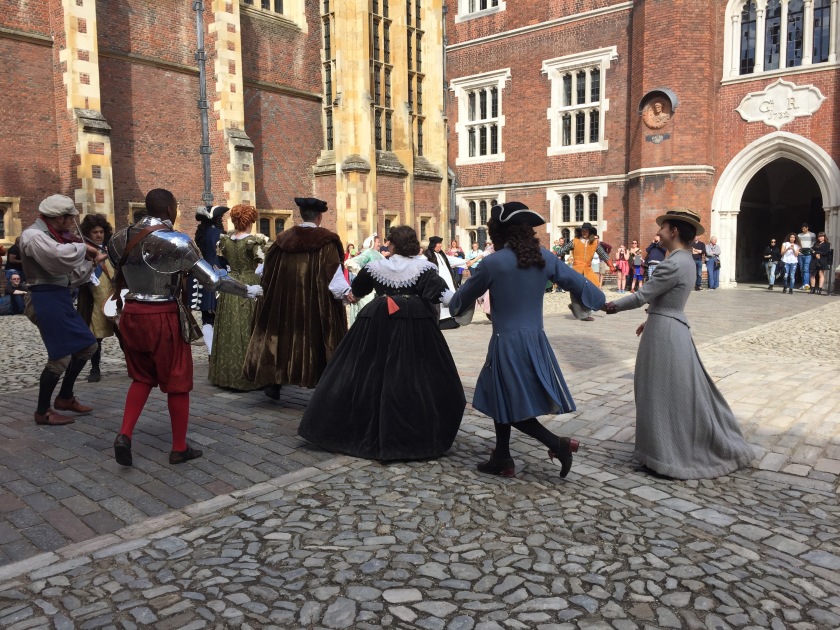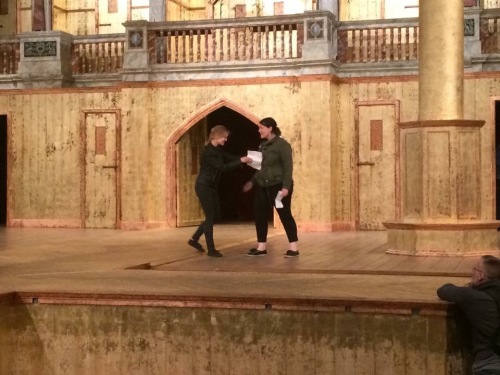This past week’s sessions all led up to Friday night’s performance on The Gobe stage. There were more rehearsals, both with our scene groups and the whole ensemble. We had another movement and voice class, but perhaps the one that got me out of my head space the most was the Historical Dance session with Huw Prall. By no means am I a dancer (nor an actor, but I’ll get to that in a minute), but I’m interested by cultural developments and became fascinated with the relation of dance to the historical period it emerged from. Huw also had me when he said he worked on the Colin Firth version of Pride and Prejudice. While I still couldn’t manage to start with the correct foot or keep in time, the lesson wasn’t threatening; it was fun! I also was able to get out of my head and the anxiety of performing our scenes for those two hours, so thank you Huw!


The Performance Wednesday’s dress rehearsal was terrifyingly invigorating, in assembling all of the information, warm ups, and recitation of the lines on the Globe stage. I thought I was doing relatively ok with the material and my nerves until the walk over, but my anxiety reached record levels, especially after seeing the first group’s run through. Our scene director, the incredibly patient Fergal McElherron, had to talk me off the cliff a bit; I was working myself up so much. I still hadn’t my lines completely down to memory, but I tried when I went up there and maybe even let an expletive (or two) out. In the end, I knew there was nothing to be terrified about but that I had more work to do.

The next night the lovely Pollyanna, our scene’s Touchstone, graciously offered to run lines with me and dilgently worked with me until I had them. In practicing with her, she pointed out I was trying too much to memorize them in order and wasn’t really listening to the conversation. Shakespeare’s dialogue is so much about the push and pull between characters, and the lines pick up threads and play off one another. When you’re really listening, you hear that and it cues you perfectly; when you forget to listen, you’re down the rabbit hole.
After that work Pollyanna and I did and after rehearsing with my group several times, I felt ready going into the rehearsals with Fergal before our official performance. I knew the lines for our scene, not just mine. We were really working on tweaking the performance and further clarifying the work; the hard bits were over.
Then we got out onto the stage. It’s London, and since we’ve had nice weather all week, of course it had to rain. The Globe has that hole in its roof so the stage and yard were soaked. It just added to the experience. While we were watching the other scenes and doing our tableaux before each scene, I could not conjure up a single line. I wasn’t nervous as before, but there was an adrenaline rush that was blocking every line out. I couldn’t find my script for one last read through, so as I stood backstage ready to emerge, it was “here goes nothing.”
I got out there and I did ok. I forgot a few lines and lost my place. I froze at one point let out a few expletives and asked Fergal what the line was, but he was nowhere to be found. We made it through our scene with Ms. Emily Hernberg as a brilliant Celia. There is no danger of my becoming an actor, nor to I desire to be one. Taking part in this program was and is about trying and experiencing something truly out of my comfort zone, while also learning new approaches to Shakespeare to help my students. I may have failed at being a brilliant Rosalind, but it wasn’t my goal. I wanted to do well for my group, especially Emily so that she could do her best, especially since she is such a natural performer.
As I tried to sleep that night, the lines all came to me and were swimming in my head as I tried to fall asleep. Where were they earlier? Obviously they were in there, so where were they when I needed them?
My head was also swirling trying to formulate my thoughts on the idea of failure. Since the FIFA Women’s World Cup this summer, I’ve been trying to wrap my head around what it means to fail. The English women’s team played a superior game to Japan, but accidentally knocked the ball in their own goal, giving Japan the win. Other than being the only time I’ve ever witnessed the internet be gracious and supportive of the player whose boot the ball was knocked off of, it also led me to question what it means to fail. They played superbly; was that performance undone by one second? The team picked themselves up by the bootstraps, came back for the next game, and and won the bronze. Is that the sign of failure?
When we started the program, Fiona encouraged us to “fail better.” While I’m working to make Thursday’s final performance there’s no guarantee that I won’t forget a line or forget a direction. My goal is to really listen and get out of my head for the ten minutes we are out on the stage. If I am able to accomplish those things, then I will have won the bronze.